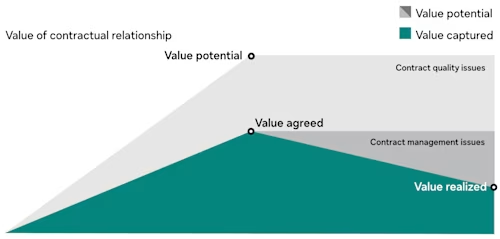
Wertverluste bei Verträgen verstehen und verringern
Der Verlust von Vertragswerten birgt für moderne Unternehmen das größte Potenzial, Vertragsabschlüsse in bare Münze zu verwandeln.
Inhaltsverzeichnis

Über die gesamte Laufzeit einer Geschäftsvereinbarung hinweg bleiben Verträge oft hinter ihrem vollen Potenzial zurück und können sogar an Wert verlieren. Die Differenz zwischen dem potenziellen Wert einer Vereinbarung und dem tatsächlich realisierten Wert bezeichnen wir als Wertverluste bei Verträgen (englisch “Contract Value Leakage”).
Da moderne Vertragssysteme immer komplexer werden und ein breiteres Spektrum an End-to-End-Funktionen umfassen, ist es für Unternehmen wichtig, ihre Vertragsabläufe zu überprüfen und die Auswirkungen dieser Tools auf die Kosten neu zu berechnen.
Der Verlust von Vertragswerten birgt für moderne Unternehmen das größte Potenzial, Vertragsabschlüsse in bare Münze zu verwandeln. Leckagen können sowohl vor der Unterzeichnung (Unterzeichnung suboptimaler Verträge) als auch bei der Ausführung (schlechtes Verständnis des Vertragsinhalts und Unfähigkeit, die Bedingungen auszuführen) auftreten.

Um Value Leakage näher zu untersuchen, ist es hilfreich, Beispiele für moderne Probleme zu untersuchen, die zu Wertverlusten beitragen. Nehmen wir das Beispiel eines Unternehmens, das Online-Dienste verkauft. Für jeden Verkauf erstellt das Unternehmen einen Vertrag, verhandelt mit potenziellen Kundinnen und Kunden über die Bedingungen, führt die Bedingungen aus und versucht, den Vertrag mit dem Kunden nach Ablauf zu verlängern. Im Folgenden werden die Möglichkeiten für Wertverluste in diesem Prozess beschrieben. Um mehr Klarheit zu schaffen, werden diese Probleme in zwei größeren Kategorien erörtert: Probleme der Vertragsqualität und Probleme des Vertragsmanagements.
Probleme der Vertragsqualität
Wertverluste, die vor der Vertragsunterzeichnung auftreten, sind das Ergebnis schlechter Vertragsqualität. Diese Probleme machen im Allgemeinen etwa zwei Drittel aller Leckagen aus. Wertverluste aufgrund der Vertragsqualität entstehen, wenn die Parteien Verträge unterzeichnen, die in der Vorbereitungs- und Verhandlungsphase nicht optimiert wurden, so dass sie für die Parteien suboptimale Formulierungen enthalten. Hier sind einige häufige Fehler bei der Vertragsqualität, die unser Beispielunternehmen für Online-Dienste machen könnte:
Schlecht verhandelt: Im Laufe einer Verhandlung erklärt sich das Unternehmen bereit, seine Dienstleistung an einen Kunden oder eine Kundin zu einem Preis zu verkaufen, der niedriger ist als der von anderen Kunden akzeptierte Preis.
Unvorteilhafte Verpflichtungen: Das Unternehmen akzeptiert die von einem Kunden in einen Vertrag eingefügten Bedingungen und stimmt unwissentlich schweren Pönalen für Leistungsausfälle und Haftungsüberschreitungen zu.
Unklare Leistungskennzahlen: Das Unternehmen schließt einen Vertrag mit einem Lieferanten ab, ohne klare Angaben zur Leistung eines Produkts zu machen. Wenn ein fehlerhaftes Produkt geliefert wird, muss das Unternehmen Zeit und Ressourcen investieren, um das Problem zu beheben, was die Gesamtbetriebskosten erhöht. Alternativ könnte das Unternehmen rechtliche Schritte einleiten, was ebenfalls die Kosten erhöhen würde.
Probleme beim Vertragsmanagement
Wertverluste, die nach dem Vertragsabschluss auftreten, sind das Ergebnis von schlechtem Vertragsmanagement. Das größte Problem in dieser Phase besteht darin, dass Unternehmen den Inhalt ihrer Verträge nur unzureichend kennen und sich nicht an die vereinbarten Bedingungen halten. Aufgrund dieser Unzulänglichkeiten verpassen Unternehmen Gelegenheiten, Verträge korrekt und vorteilhaft zu erneuern. Im Folgenden werden Fehler im Vertragsmanagement aufgeführt, die unser Beispielunternehmen machen könnte:
Fehler bei der Lieferung/Vergütung: Ohne den richtigen Überblick über die vertraglichen Verpflichtungen schließt das Unternehmen einen Verkauf ab, versäumt es aber, dem Kunden oder der Kundin die Leistung rechtzeitig zu erbringen. Ähnliche Fehler können auch bei der Qualität oder Vollständigkeit der Dienstleistung auftreten. Ebenso kann es vorkommen, dass das Unternehmen die Dienstleistung aktiviert, aber die Zahlung nicht korrekt einzieht.
Nicht eingeforderte Verpflichtungen: Je nachdem, was nach der Aktivierung geschieht, schulden die Kunden dem Unternehmen möglicherweise Strafgebühren oder Gebühren für Zusatzleistungen, überschrittene Schwellenwerte oder versäumte Verpflichtungen. Wenn das Unternehmen den Inhalt seiner Vereinbarungen nicht genau kennt, entgehen ihm diese Möglichkeiten für zusätzliche Einnahmen
Versagen beim Change Management: Da sich das Unternehmen und die Geschäftswelt im Laufe des Vertragszyklus weiterentwickeln, müssen möglicherweise Änderungen vorgenommen werden. Regulatorische Änderungen oder andere Ereignisse können neue Maßnahmen erforderlich machen, um die Verantwortlichkeiten aufrechtzuerhalten oder die Vorschriften einzuhalten. Dies ist vor allem dann von Bedeutung, wenn das Unternehmen über die Erneuerung von Verträgen verhandelt.
Es gibt mehrere negative Folgen des Verlusts von Vertragswerten, aber die Hauptauswirkungen sind entgangene finanzielle Vorteile, laufende Kosten (sowohl direkte als auch indirekte), vermeidbare Vertragsstrafen und verpasste Gelegenheiten für Vertragsverlängerung, Cross-Selling oder Upselling.
Eine Möglichkeit, Value Leakage von Verträgen zu verringern, ist der Einsatz eines modernen Vertragssystems, das die Erstellung von Verträgen standardisiert, bestehende (oder neue) Verträge schnell analysiert und wichtige Unternehmenstools für die Umsetzung von Vertragsbedingungen miteinander verbindet. Mit einheitlichen Vereinbarungen, die aus einer Bibliothek von vorab genehmigten Vorlagen und Klauseln erstellt werden, wird die Vertragsqualität erheblich verbessert. Sobald der Vertrag von allen Parteien unterzeichnet ist, kann das System die Leckage weiter minimieren, indem es die Verträge analysiert, um auf Vorfälle zu reagieren und alle notwendigen Maßnahmen zu automatisieren.
Ein weiteres Merkmal moderner Vertragssysteme ist die Möglichkeit, eine beliebige Anzahl bestehender Verträge in fast jedem Format und von fast jedem Ort aus zu erfassen. Diese Dateien können hochgeladen und in ein durchsuchbares Dokument im Aufzeichnungssystem umgewandelt werden. Moderne KI-basierte Vertragsanalyse-Tools können dann genutzt werden, um wertvolle Erkenntnisse aus diesen Dokumenten zu gewinnen und potenzielle Risiken oder Chancen zu identifizieren.
Im E-Book "Recalculating the Value of a Modern System of Agreement" erfahren Sie mehr über Werteverluste von Verträgen und andere Möglichkeiten, wie digitale Vertragstools einen Mehrwert für Ihr Unternehmen schaffen können. Elektronische Signaturen können beispielsweise den Vertragsabschlussprozess beschleunigen und die Effizienz steigern, während Integrationen mit CRM-Systemen wie Salesforce eine nahtlose Verwaltung von Kundenverträgen ermöglichen.

Ähnliche Beiträge
Docusign IAM ist die Vertragsplattform, die Ihr Unternehmen braucht



